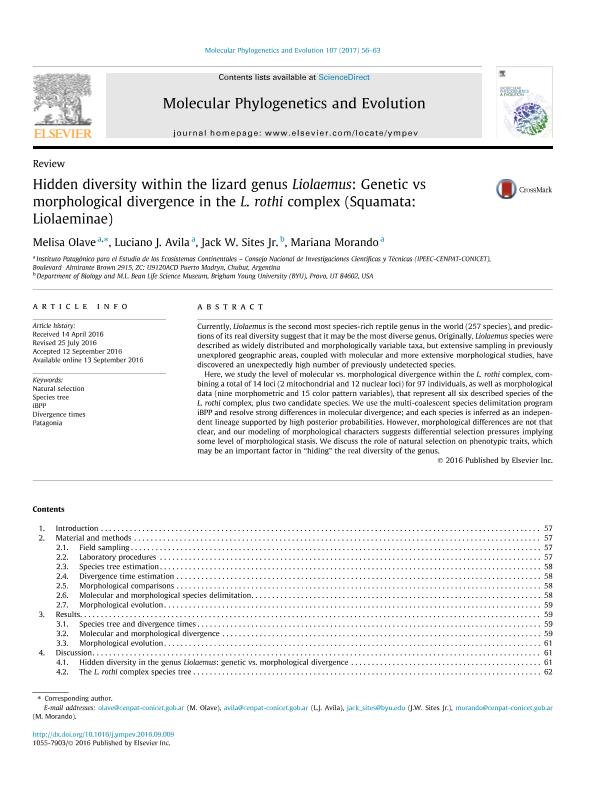Mostrar el registro sencillo del ítem
dc.contributor.author
Olave, Melisa

dc.contributor.author
Avila, Luciano Javier

dc.contributor.author
Sites Jr., Jack W.
dc.contributor.author
Morando, Mariana

dc.date.available
2018-12-05T19:44:48Z
dc.date.issued
2017-02
dc.identifier.citation
Olave, Melisa; Avila, Luciano Javier; Sites Jr., Jack W.; Morando, Mariana; Hidden diversity within the lizard genus Liolaemus: Genetic vs morphological divergence in the L. rothi complex (Squamata: Liolaeminae); Academic Press Inc Elsevier Science; Molecular Phylogenetics and Evolution; 107; 2-2017; 56-63
dc.identifier.issn
1055-7903
dc.identifier.uri
http://hdl.handle.net/11336/65933
dc.description.abstract
Currently, Liolaemus is the second most species-rich reptile genus in the world (257 species), and predictions of its real diversity suggest that it may be the most diverse genus. Originally, Liolaemus species were described as widely distributed and morphologically variable taxa, but extensive sampling in previously unexplored geographic areas, coupled with molecular and more extensive morphological studies, have discovered an unexpectedly high number of previously undetected species. Here, we study the level of molecular vs. morphological divergence within the L. rothi complex, combining a total of 14 loci (2 mitochondrial and 12 nuclear loci) for 97 individuals, as well as morphological data (nine morphometric and 15 color pattern variables), that represent all six described species of the L. rothi complex, plus two candidate species. We use the multi-coalescent species delimitation program iBPP and resolve strong differences in molecular divergence; and each species is inferred as an independent lineage supported by high posterior probabilities. However, morphological differences are not that clear, and our modeling of morphological characters suggests differential selection pressures implying some level of morphological stasis. We discuss the role of natural selection on phenotypic traits, which may be an important factor in “hiding” the real diversity of the genus.
dc.format
application/pdf
dc.language.iso
eng
dc.publisher
Academic Press Inc Elsevier Science

dc.rights
info:eu-repo/semantics/openAccess
dc.rights.uri
https://creativecommons.org/licenses/by-nc-sa/2.5/ar/
dc.subject
Divergence Times
dc.subject
Ibpp
dc.subject
Natural Selection
dc.subject
Patagonia
dc.subject
Species Tree
dc.subject.classification
Otras Ciencias Biológicas

dc.subject.classification
Ciencias Biológicas

dc.subject.classification
CIENCIAS NATURALES Y EXACTAS

dc.title
Hidden diversity within the lizard genus Liolaemus: Genetic vs morphological divergence in the L. rothi complex (Squamata: Liolaeminae)
dc.type
info:eu-repo/semantics/article
dc.type
info:ar-repo/semantics/artículo
dc.type
info:eu-repo/semantics/publishedVersion
dc.date.updated
2018-11-20T15:13:49Z
dc.journal.volume
107
dc.journal.pagination
56-63
dc.journal.pais
Países Bajos

dc.journal.ciudad
Amsterdam
dc.description.fil
Fil: Olave, Melisa. Consejo Nacional de Investigaciones Científicas y Técnicas. Centro Científico Tecnológico Conicet - Centro Nacional Patagónico. Instituto Patagónico para el Estudio de los Ecosistemas Continentales; Argentina
dc.description.fil
Fil: Avila, Luciano Javier. Consejo Nacional de Investigaciones Científicas y Técnicas. Centro Científico Tecnológico Conicet - Centro Nacional Patagónico. Instituto Patagónico para el Estudio de los Ecosistemas Continentales; Argentina
dc.description.fil
Fil: Sites Jr., Jack W.. University Brigham Young; Estados Unidos
dc.description.fil
Fil: Morando, Mariana. Consejo Nacional de Investigaciones Científicas y Técnicas. Centro Científico Tecnológico Conicet - Centro Nacional Patagónico. Instituto Patagónico para el Estudio de los Ecosistemas Continentales; Argentina
dc.journal.title
Molecular Phylogenetics and Evolution

dc.relation.alternativeid
info:eu-repo/semantics/altIdentifier/doi/http://dx.doi.org/10.1016/j.ympev.2016.09.009
dc.relation.alternativeid
info:eu-repo/semantics/altIdentifier/url/https://www.sciencedirect.com/science/article/pii/S1055790316302342
Archivos asociados
